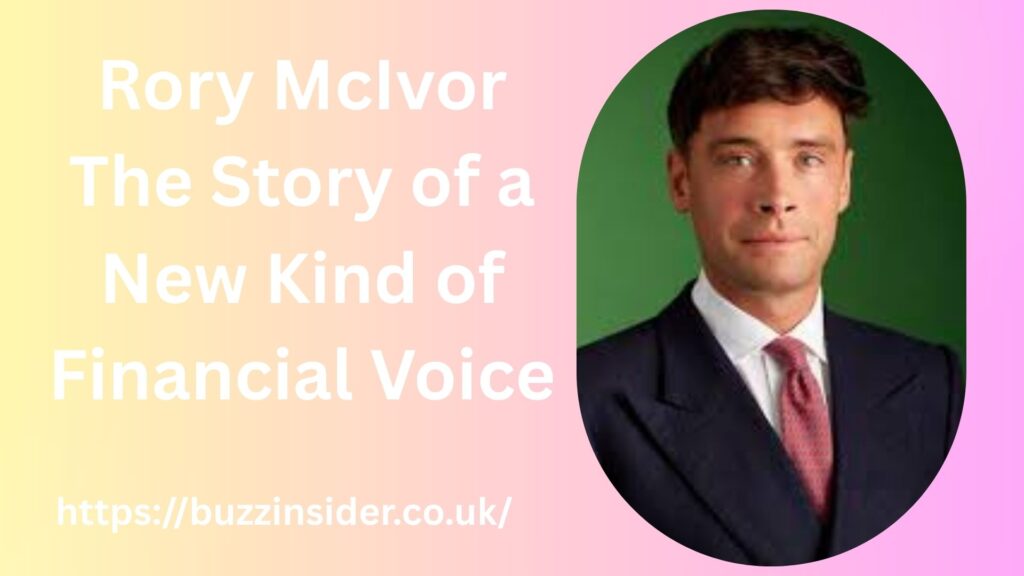Rory McIvor is more than just a name in finance he’s one of the people trying to change how we talk about money, investment, and wealth in public. He has walked in boardrooms and also into podcast studios, carrying ideas from history books into spreadsheets, weaving narratives about markets that actually make people listen. His journey feels part scholar, part communicator, part entrepreneur and it’s still unfolding.
Early Foundations & Academic Roots
To understand Rory McIvor, you have to go back to his schooling, where his curiosity was already visible. He attended Friends’ School Lisburn in Northern Ireland, where he didn’t just stick to academics he was active in sports, debating, theatre, and held leadership roles like Deputy Head Boy.
From there, he went on to the University of Edinburgh, studying History and Politics, and graduated with First Class Honours. His studies ranged broadly from the Scottish Enlightenment to modern Irish history and U.S. foreign policy. That breadth, that sense of context, would later feed into how he explains financial markets.
But Rory McIvor didn’t stop there. In 2025 (or around that time), he entered the University of Cambridge for an MPhil in Modern British and Irish History, with focus areas including figures like Roger Casement. This shows that even while building a career, he keeps one foot in scholarly inquiry.
From Ruffer to Public Voice Professional Arc
One of Rory’s major chapters was his time at Ruffer LLP, a London-based investment management firm. He joined in 2017 as an Investment Associate, working in private wealth and gradually evolving into a public‑facing role.
Over time, he became Director of Markets & Communications at Ruffer. In that position, he wasn’t just crunching numbers or managing portfolios he was shaping how Ruffer communicated with clients, media, and the broader public. He edited The Ruffer Review, hosted podcasts, created short-form video content, and helped bring stories to life sometimes weaving in history, sometimes analogies, sometimes plain everyday examples.
He also appeared in Ruffer’s “Green Line” series monthly commentary tied to charts helping interpret data in human terms.Over his years there, he bridged the gap between the abstract world of finance and the lived world of people trying to understand what happens to their money.
By early 2025, Rory decided to leave Ruffer after almost a decade. On his LinkedIn, he wrote:
“At the beginning of this year, I decided to leave Ruffer after the best part of a decade.”
That felt like a turning point leaving comfort and reputation behind for a riskier, more personal path.
The Birth of Pretty Penny
In 2025, Rory founded Pretty Penny, his new venture, which aims to transform how investment education is delivered. The idea as far as public knowledge goes is to blend financial insight with media, storytelling, creative content. Make it less dusty, less jargon‑filled, more intuitive.
Pretty Penny isn’t just for sophisticated investors. It’s meant to speak to people who might be intimidated by finance, who want clarity, who want to understand why markets move, or how financial decisions affect their lives. By merging narrative with analysis, Rory McIvor hopes to build something that resonates more than a standard white paper.
Personal Life & Public Profile
It’s rare that someone in investment gets mentioned in the same breath as reality media, but Rory’s personal life brought that twist. In 2024, he became publicly associated with Olivia “Liv” Bentley, a personality from Made in Chelsea. Their relationship drew media attention, especially as Liv spoke in interviews about how Rory influenced her views on family, life, purpose.
That intersection finance + media + lifestyle has helped Rory become known beyond strictly financial circles. He is emerging (if he hasn’t already) as a figure people talk about not only because of money, but because of story, values, authenticity.
His age isn’t officially confirmed, but by timelines (school, university, career) many estimate he was born around 1993 or 1994. That puts him in his early 30s in 2025.
He tends to keep his family background fairly private; public records and interviews emphasize his intellectual and professional path more than lineage.
What Sets Rory Apart Strengths, Style & Vision
If I were to step back and look at what makes Rory interesting what makes him “SEO-worthy” and media-worthy several things stand out:
- Historian’s mind in a finance body
Many financial communicators skip the context. Rory naturally pulls history, narratives, cultural frames into markets. That layering helps people see markets not as random charts but as continuations of human stories. - Communicator first, financier second
In many firms, communication is an afterthought. Rory’s path suggests he treats communication as central. At Ruffer, he didn’t just make reports; he told stories. At Pretty Penny, it looks like he’s going all in on communication as product. - Accessible but not simplistic
He seems to want to respect the intelligence of his audience explain, not dumb down. But also avoid needless jargon. That balance matters in content, especially when lots of finance content is either overly technical or patronizing. - Risk-taking, re‑invention
Quitting a stable, senior role to start something new takes guts. That kind of pivot is a statement: he’s betting on his ideas, reputation, and voice. - Cross‑realm influence
Because of his relationship with Liv Bentley and his media engagements, Rory isn’t confined to finance circles. That broader visibility can amplify his influence, whether positively or negatively. It’s both opportunity and pressure.

Challenges & Questions Ahead
This isn’t to paint Rory as flawless. There are inevitable challenges in what he’s doing:
- Trust and credibility: Moving into more public, content-driven work, he has to maintain credibility in a space where many voices make claims without substance.
- Scalability: Can Pretty Penny grow beyond being Rory’s voice? Will it become a team, a platform, a brand?
- Balancing depth and attention spans: Social media, short videos, headlines it’s hard to deliver nuance under those constraints.
- Criticism and scrutiny: With visibility comes more public scrutiny. His decisions, his personal life, his analyses will get examined.
Why People Should Pay Attention to Rory McIvor
- If you’re someone who’s bored or intimidated by financial commentary, Rory McIvor is a person to watch because he tries to make it come alive.
- If you believe finance should talk to people not at them Rory’s path offers lessons.
- For entrepreneurs, Rory’s shift from senior role to founding his own voice-forward venture is a case study in career reinvention.
- For anyone curious about how media, narrative, and money overlap, Rory is a real-world experiment in that territory.



